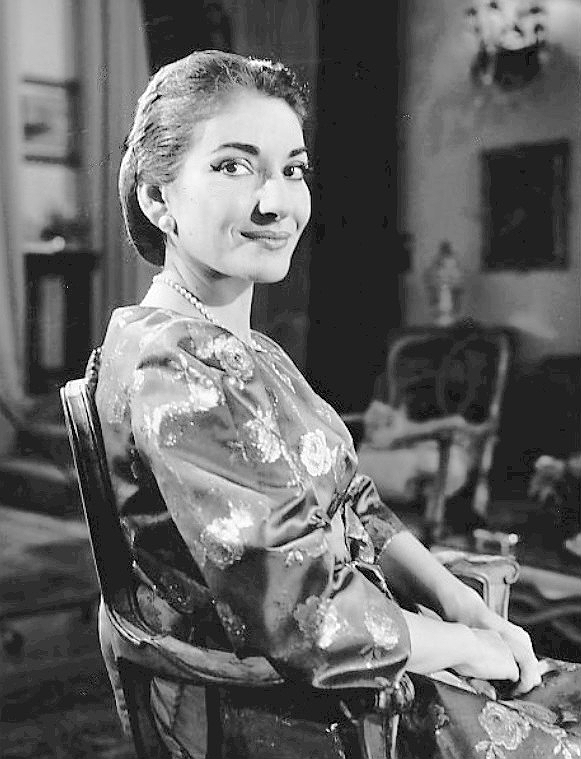
‘Fresh Air’ marks the 100th birthday of legendary opera soprano Maria Callas
By Lloyd Schwartz. Originally published by NPR.org.
Widely considered the greatest singing actor in opera history, Callas died in 1977 at the age of 53. Now, several new releases celebrate both her singing and her acting.
SOUNDBITE OF SONG, “MEDEA, ACT 1: ‘DEI TUOI FIGLI LA MADRE’ (MEDEA) [LIVE]”)
MARIA CALLAS: (Singing in Italian).
LLOYD SCHWARTZ, BYLINE: That was Maria Callas in a live performance at La Scala in 1953, conducted by Leonard Bernstein. The opera was Luigi Cherubini’s 1798 Medea, a neglected work in which Callas’ thrilling and complex performance revived new interest. The sorceress Medea has been abandoned by her lover Jason, the father of their two children. In the aria, she’s both accusing Jason of cruelty and begging him for pity. Who but Callas was capable of expressing simultaneous extremes of pathos and rage?
Both her live and studio performances of Medea are part of a new 135-disc box set just released for her 100th birthday. The set is called La Divina: Maria Callas in All Her Roles, which is not 100% accurate since no audio seems to exist for Callas in at least a couple of her earliest roles. But the set includes at least one complete recording of each of the operas she made commercially, as well as live performances of operas and concerts, her famous master classes at Juilliard, Blu-rays of her few televised performances and even alternate takes and working studio sessions released here for the very first time. If you’re brand-new to the Callas phenomenon, this gigantic collection would be one-stop shopping.
Another well-timed Callas birthday release is a new Blu-ray of her only movie. It’s also called Medea and is part of the Criterion Collection’s new box set of nine films by the powerful and disturbing Italian director Pier Paolo Pasolini. His 1969 Medea is a very personal, political, visceral and violent take on the same Euripides tragedy that inspired Cherubini’s more austere and formal opera. In the film, Callas is not so much a classical heroine as a more primal priestess wallowing in bloody rituals. She doesn’t sing a note, and the music here has the unoperatic quality of Middle Eastern and Eastern European folk music.
(SOUNDBITE OF ARCHIVED RECORDING)
UNIDENTIFIED MUSICAL GROUP: (Singing in non-English language).
SCHWARTZ: Callas’s acting is overwhelming. Even though Medea doesn’t speak very much, Callas’s eyes alone reveal her profound spirituality, sexual turmoil, motherly affection and unbridled desire for revenge. When Medea does speak, she has hair-raising things to say, which brings me to my one major reservation about this movie. Callas and Pasolini evidently loved working together, but for some reason he didn’t seem to like the way she spoke Italian, even though she sang most of her operatic roles in Italian, even in operas that were intended to be sung in German or French, like Medea. But in the most widely distributed version of the film – the one in Italian, which is the one in the new Criterion set – Medea’s speaking voice is the voice of Rita Savagnone, an actress who dubbed the Italian voices of such English speaking stars as Vanessa Redgrave, Joan Collins, Whoopi Goldberg and Liza Minnelli. At least a version of the film exists in which Callas actually dubbed her own voice in English. Here is Medea praying desperately to her lost gods.
(SOUNDBITE OF FILM, MEDEA)
CALLAS: (As Medea) Speak to me, Earth. Speak to me, sun. You are disappearing, never to return again. I can no longer hear what you are saying.
SCHWARTZ: And here’s Medea, the tender mother, soothing her two young sons just before she’s about to murder them.
(SOUNDBITE OF FILM, MEDEA)
CALLAS: (As Medea) Come, my love. Come, my little man. Sleep. Sleep. Sleep.
SCHWARTZ: And it’s Callas who gets the inexorable final line of the movie in English.
(SOUNDBITE OF FILM, MEDEA)
CALLAS: (As Medea) Now your tears are nothing. You will understand when you are old.
UNIDENTIFIED ACTOR: (As character) I beg you in the name of the god you hold dear, please let me touch once more those poor, innocent bodies.
CALLAS: (As Medea) No. And don’t ask again. It’s useless. Nothing is possible anymore.
SCHWARTZ: As far as I know, the only way to hear the English version is on a British Film Institute DVD, which requires an international DVD player. But what’s even more tragic is that Maria Callas didn’t make more movies.
Arizona Theatre Company is excited to be presenting Master Class in the Spring of 2024. Master Class is a Tony-winning play by Terrence McNally, that tells the story of the uncompromising opera diva Maria Callas as she delivers a life altering master class to students at an elite opera training program. During the class, she encounters three vastly different students who are by turns hilariously crushed, soulfully uplifted, and profoundly inspired by her singular artistry. Based on a series of real-life classes Callas delivered at Juilliard, Master Class inspires us, transports us, and transforms us by carving a window into the soul of one of the most complicated and celebrated artists of the 20th century who pushed the boundaries of artistic sacrifice and quality.
To learn more about the production, click the button below.